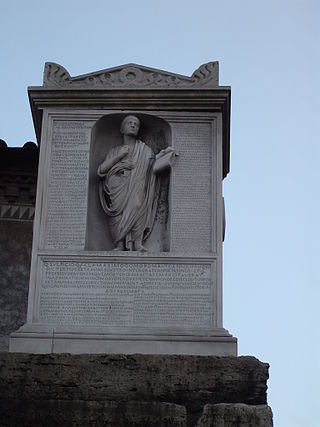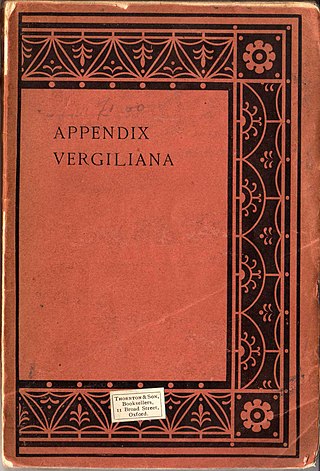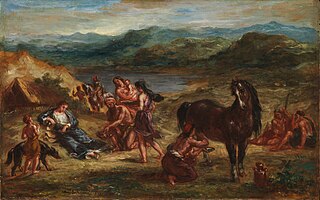Related Research Articles
Dactylic hexameter is a form of meter or rhythmic scheme frequently used in Ancient Greek and Latin poetry. The scheme of the hexameter is usually as follows :
The elegiac couplet or elegaic distich is a poetic form used by Greek lyric poets for a variety of themes usually of smaller scale than the epic. Roman poets, particularly Catullus, Propertius, Tibullus, and Ovid, adopted the same form in Latin many years later. As with the English heroic couplet, each pair of lines usually makes sense on its own, while forming part of a larger work.
Hexameter is a metrical line of verses consisting of six feet. It was the standard epic metre in classical Greek and Latin literature, such as in the Iliad, Odyssey and Aeneid. Its use in other genres of composition include Horace's satires, Ovid's Metamorphoses, and the Hymns of Orpheus. According to Greek mythology, hexameter was invented by Phemonoe, daughter of Apollo and the first Pythia of Delphi.
In poetry, metre or meter is the basic rhythmic structure of a verse or lines in verse. Many traditional verse forms prescribe a specific verse metre, or a certain set of metres alternating in a particular order. The study and the actual use of metres and forms of versification are both known as prosody.

Publius Ovidius Naso, known in English as Ovid, was a Roman poet who lived during the reign of Augustus. He was a younger contemporary of Virgil and Horace, with whom he is often ranked as one of the three canonical poets of Latin literature. The Imperial scholar Quintilian considered him the last of the Latin love elegists. Although Ovid enjoyed enormous popularity during his lifetime, the emperor Augustus exiled him to Tomis, the capital of the newly-organised province of Moesia, on the Black Sea, where he remained for the last nine or ten years of his life. Ovid himself attributed his banishment to a "poem and a mistake", but his reluctance to disclose specifics has resulted in much speculation among scholars.

Archilochus was a Greek lyric poet of the Archaic period from the island of Paros. He is celebrated for his versatile and innovative use of poetic meters, and is the earliest known Greek author to compose almost entirely on the theme of his own emotions and experiences.

The Metamorphoses is a Latin narrative poem from 8 CE by the Roman poet Ovid. It is considered his magnum opus. The poem chronicles the history of the world from its creation to the deification of Julius Caesar in a mythico-historical framework comprising over 250 myths, 15 books, and 11,995 lines.

A dactyl is a foot in poetic meter. In quantitative verse, often used in Greek or Latin, a dactyl is a long syllable followed by two short syllables, as determined by syllable weight. The best-known use of dactylic verse is in the epics attributed to the Greek poet Homer, the Iliad and the Odyssey. In accentual verse, often used in English, a dactyl is a stressed syllable followed by two unstressed syllables—the opposite is the anapaest.
The adjective elegiac has two possible meanings. First, it can refer to something of, relating to, or involving, an elegy or something that expresses similar mournfulness or sorrow. Second, it can refer more specifically to poetry composed in the form of elegiac couplets.

The Tristia is a collection of poems written in elegiac couplets by the Augustan poet Ovid during the first three years following his banishment from Rome to Tomis on the Black Sea in AD 8. Despite five books in which he bewails his fate copiously, the immediate cause of Augustus' banishment of the most acclaimed living Latin poet to Pontus remains a mystery. In addition to the Tristia, Ovid wrote another collection of elegiac epistles on his exile, the Epistulae ex Ponto, as well as a 642-line curse poem called Ibis, directed against the unnamed enemy who had apparently caused his downfall. He spent several years in the outpost of Tomis and died in AD 17 or 18 without ever returning to Rome.

The history of Latin poetry can be understood as the adaptation of Greek models. The verse comedies of Plautus, the earliest surviving examples of Latin literature, are estimated to have been composed around 205–184 BC.

Heroic verse is a term that may be used to designate epic poems, but which is more usually used to describe the meter(s) in which those poems are most typically written. Because the meter typically used to narrate heroic deeds differs by language and even within language by period, the specific meaning of "heroic verse" is dependent upon context.

The Appendix Vergiliana is a collection of Latin poems traditionally ascribed as being the juvenilia of Virgil.

Amores is Ovid's first completed book of poetry, written in elegiac couplets. It was first published in 16 BC in five books, but Ovid, by his own account, later edited it down into the three-book edition that survives today. The book follows the popular model of the erotic elegy, as made famous by figures such as Tibullus or Propertius, but is often subversive and humorous with these tropes, exaggerating common motifs and devices to the point of absurdity.

The Heroides, or Epistulae Heroidum, is a collection of fifteen epistolary poems composed by Ovid in Latin elegiac couplets and presented as though written by a selection of aggrieved heroines of Greek and Roman mythology in address to their heroic lovers who have in some way mistreated, neglected, or abandoned them. A further set of six poems, widely known as the Double Heroides and numbered 16 to 21 in modern scholarly editions, follows these individual letters and presents three separate exchanges of paired epistles: one each from a heroic lover to his absent beloved and from the heroine in return.

The Fasti, sometimes translated as The Book of Days or On the Roman Calendar, is a six-book Latin poem written by the Roman poet Ovid and published in AD 8. Ovid is believed to have left the Fasti incomplete when he was exiled to Tomis by the emperor Augustus in 8 AD. Written in elegiac couplets and drawing on conventions of Greek and Latin didactic poetry, the Fasti is structured as a series of eye-witness reports and interviews by the first-person vates with Roman deities, who explain the origins of Roman holidays and associated customs—often with multiple aetiologies. The poem is a significant, and in some cases unique, source of fact in studies of religion in ancient Rome; and the influential anthropologist and ritualist J.G. Frazer translated and annotated the work for the Loeb Classical Library series. Each book covers one month, January through June, of the Roman calendar, and was written several years after Julius Caesar replaced the old system of Roman time-keeping with what would come to be known as the Julian calendar.
Greek and Latin metre is an overall term used for the various rhythms in which Greek and Latin poems were composed. The individual rhythmical patterns used in Greek and Latin poetry are also known as "metres".

Medicamina Faciei Femineae is a didactic poem written in elegiac couplets by the Roman poet Ovid. In the hundred extant verses, Ovid defends the use of cosmetics by Roman women and provides five recipes for facial treatments. Other writers at the time condemned women's usage of cosmetics.

Ovid, the Latin poet of the Roman Empire, was banished in 8 AD from Rome to Tomis by decree of the emperor Augustus. The reasons for his banishment are uncertain. Ovid's exile is related by the poet himself, and also in brief references to the event by Pliny the Elder and Statius. At the time, Tomis was a remote town on the edge of the civilized world; it was loosely under the authority of the Kingdom of Thrace, and was superficially Hellenized. According to Ovid, none of its citizens spoke Latin, which as an educated Roman, he found trying. Ovid wrote that the cause of his exile was carmen et error, probably the Ars Amatoria and a personal indiscretion or mistake. The council of the city of Rome revoked his exile in December 2017, 2,009 years after his banishment.
Latin prosody is the study of Latin poetry and its laws of meter. The following article provides an overview of those laws as practised by Latin poets in the late Roman Republic and early Roman Empire, with verses by Catullus, Horace, Virgil and Ovid as models. Except for the early Saturnian poetry, which may have been accentual, Latin poets borrowed all their verse forms from the Greeks, despite significant differences between the two languages.
References
- ↑ Hermann Fränkel, Ovid: A Poet between Two Worlds (University of California Press, 1956), p. 152.
- ↑ Oliver Taplin, Literature in the Greek and Roman Worlds: A New Perspective (Oxford University Press, 2000), p. 437 online.
- ↑ Verdière, R. (1971). "Un amour secret d'Ovide". L'Antiquité Classique, 623-648; Janssens, L. (1981): "Deux complexes d'acrostiches délateurs d'Ibis, alias C. Ateius Capito. Le mysticisme du culte d'Abrasax", Revue de Philologie 55, 57-71.
- ↑ The Athenaeum, No. 2840, April 1, 1882
- 1 2 A. Schiesaro, "Ibis Redibis," Materiali e Discussioni 67 (2011): 79–150.
- 1 2 Martin Helzle, "Ibis," in A Companion to Ovid, edited by Peter E. Knox (Blackwell, 2009) online.
- ↑ A. E. Housman, "The Ibis of Ovid," Journal of Philology 35 (1920): 287–318
- ↑ G. D. Williams, The Curse of Exile: A Study of Ovid's Ibis (1996).
- ↑ Krasne, Darcy (2012-12-01). "The Pedant's Curse: Obscurity and Identity in Ovid's Ibis". Dictynna. Revue de poétique latine (in French) (9). doi: 10.4000/dictynna.912 . ISSN 1765-3142.
- ↑ Verdière, R. (1971). "Un amour secret d'Ovide". L'Antiquité Classique, 623-648.
- ↑ Janssens, L. (1981): "Deux complexes d'acrostiches délateurs d'Ibis, alias C. Ateius Capito. Le mysticisme du culte d'Abrasax", Revue de Philologie 55, 57-71. CA P I T O is found at the beginning of lines 8, 14–15, and 1–2 of Ibis and AT EI AT EI at the end of lines 3, 8, 13, and 18, with VS in lines 10 and 11. In Tristia 5.11 all three names CAIVS ATEIVS CAPITO are interleaved as an acrostic in lines 20–29.
- ↑ The Metamorphoses is written in dactylic hexameter; the first line of a Latin elegiac couplet is dactylic hexameter, however, so the Metamorphoses itself is not a metrical exception in Ovid's extant work. His lost tragedy Medea presumably used other measures.
- ↑ Gareth D. Williams, "On Ovid's Ibis: A Poem in Context," in Oxford Readings in Ovid (Oxford University Press, 2006), p. 447, note 12 online.
- ↑ Andreas Dorschel, "Entwurf einer Theorie des Fluchens", Variations 23 (2015), § 24, pp. 167-175, p. 173.
- ↑ Ov. Tr. 3.14.37–38
- ↑ Kenney, E. J.; Clausen, Wendell Vernon; Clausen, W. V. (1982-03-18). The Cambridge History of Classical Literature: Volume 2, Latin Literature. Cambridge University Press. ISBN 978-0-521-21043-0.
- 1 2 Kerrigan, John (1996-04-18). Revenge Tragedy : Aeschylus to Armageddon: Aeschylus to Armageddon. Clarendon Press. ISBN 978-0-19-159172-3.
- ↑ Krasne, Darcy A. (2016). "Crippling Nostalgia: Nostos, Poetics, and the Structure of the Ibis". TAPA. 146 (1): 149–189. ISSN 2575-7199.
- ↑ R. Ellis, "On the Ibis of Ovid," Journal of Philology 7 (1877) 244–255, full text online.
- ↑ Henry T. Riley, "The Invective Against the Ibis," in The Fasti, Tristia, Pontic Epistles, Ibis, and Halieuticon of Ovid, Literally Translated into English Prose (London 1885), pp. 475ff.